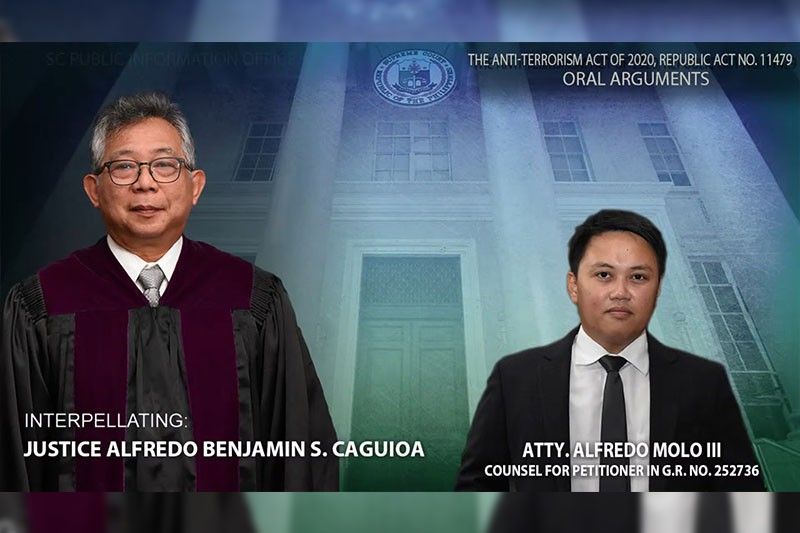Justice Caguioa asks: Is detention under Anti-Terrorism Act similar to a warrant?

MANILA, Philippines — Part of the discussions during the third day of oral arguments on the petitions against the Anti-Terrorism Act of 2020 again centered on supposed overbroad powers given to the Anti-Terrorism Council, where the executive branch officials sit.
On the resumption of debates for the third day on Tuesday, Associate Justice Alfredo Benjamin Caguioa asked the petitioners: Is a person subjected to a written authority of the ATC to law enforcers, detained and in turn deprived his or her liberty, also under arrest even though only judges can issue a warrant?
Caguioa asked University of the Philippines law professor Alfredo Molo III on the petitioners’ argument that Section 29 of the law is unconstitutional as it allows the up to 24 days of detention of suspected terrorists without judicial charge under written authority of the ATC.
A person subjected to the written authority from the ATC can be detained for 14 days, extendible with another ten days. There will be deprivation of liberty too, Molo said.
“Similar to a warrant of arrest?” Caguioa asked, and Molo answered in the affirmative.
Caguioa went on that in the 1990 case Salazar vs Achacoso, “the court categorically ruled that under the 1987 Constitution, only judges and no other may issue warrants of arrest.”
But the justice pointed out that Section 29 of the law states that the ATC, which is obviously not a court, can issue a “piece of paper that will effect a deprivation of liberty.”
“So if it walks like a duck, quacks like a duck, it must be a duck,” Caguioa pointed out.
Molo mixed his animals for a while and said it’s a dog with a different color.
Caguioa, after quipping he was talking about ducks, then pressed: “So simply by virtue of operation of section 29, this court is now confronted with an issue relating to a violation of separation of powers correct?”
Molo said yes, and explained that separation of powers is one of their argument, “because the real proposition of the ATA is: Can Congress by simply citing a national security concern get a core function of the judiciary and turn it over to the executive branch?”
Designation vs proscription
Caguioa also asked Molo to differentiate the proscription and designation of terrorists.
Under Section 25 of the law, the ATC may designate as terrorists an individual or groups upon a finding of probable cause. “The designation shall be without prejudice to the proscription of terrorist organizations, associations or groups of persons under Section 26 of this act,” the provision further read.
The Department of Justice, under Section 26, can file before the Court of Appeals a proscription petition to declare a person or group as terrorist.
But isn't the DOJ chief a member of the ATC too?
Caguioa said: “Don’t you think that it would easier for him as the SOJ to merely designate a person as terrorist instead of having to litigate that issue before the CA?”
Molo said there is no incentive for going through court process for proscription when it has virtually the same effect with designation of terrorists which takes a shorter route.
He added: “That’s another argument we raised in our petition your honor because the ATA makes it appear that the judges or the CA has a role but in terms of effect we actually created a table that you can reach all of your targets through designation instead of proscription.”
To recall, the DOJ in 2018 had asked the Manila court to proscribe as terrorist more than 600 individuals, including a United Nations rapporteur. The list, eventually trimmed down to just two names, remains pending more than two years later.
The ATC meanwhile in December, or less than six months since the ATA was enacted, issued a resolution designating the Communist Party of the Philippines and its armed wing, New People’s Army as a terrorist organization.
National Union of Peoples’ Lawyers chairman Neri Colmenares, one of the oralists, had also said that a person with affiliation to the CPP-NPA would be subjected to designation and be detained under Section 29 of the law.
Caguioa asked: “Can they already be prosecuted even as they are not yet designated so long as they're purported, affiliated organizations of CPP-NPA?”
Colmenares replied: “I believe so, your honor... Even if you are not designated you can be arrested under Section 29 for being suspected.”
Interpellation of the petitioners will continue on February 23, the fourth day of the oral arguments, Meanwhile recaps of the first three days may be read here, here and here.
- Latest
- Trending































